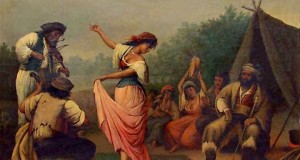One of the issues for adventurers in Promethea are the travel restrictions – in general, one must have a certified reason to go for longer trips, while some troubled regions require extensive documentation to travel even to the next village. A tradition beginning in Hungary in the 18th Century, the Czárdás represents an option for adventurers with musical abilities.
In Promethea, it becomes the Cigány – the Romani equivalent. By the mid-19th Century, there was a strong tradition of travelling Romani musicians in Transylvania and into Wallachia. Folk bands, led by a Kappelmeister, spent the winters playing locally at various balls. In the summer, the best of them travelled far and wide, including to Bucharest, and were well paid by the standards of the time and well respected. Even the stiff-upper-lipped English traveller Charles Boner was deeply impressed by the musicianship of the Roma players, though insisted on using the Hungarian name for the music and not the Roma one. Indeed, he waxes lyrical with an intense enthusiasm that speaks of many enjoyable evenings that he didn’t detail in his book:
“For the dance no music can be better than that of a gipsy band: there is a life and animation to it which carries you away. If you have danced to it yourself, especially in a Czárdás, then to hear the stirring tones, without involuntarily springing up, is, I assert, an absolute impossibility. There is a thrill in the wild dissonances, a life and impetuosity in the movement, an animation and vivacity in the varying rhythm, which is quite enthralling. And the dancers feel the thrill: see how they glide majestically along as the prelude is slow and sonorous; and as the music quickens, and there is a rush of tones, and the fantastic melody hastens on at a headlong pace, how all are seized by the potency of the spell; their movements quicken too, their feet beat time to the music; and suddenly clasping their willing partner round the waist, they whirl round, carried away by, and bourne, as it were, upon that gushing flood of strangely intermingling tones.
“There must be something in that dance which is irresistible; for long as a Czárdás may last, – and its duration may be of any length, – directly the musicians stop there is on all sides a clapping of hands, and loud shouts for them to begin again. A single dance never satisfies; it only arouses and makes you long for more.”
Boner was very impressed by the abilities of the Romani musicians, particularly considering the tools they had at their disposal:
“These men are born musicians. They learn of themselves, and as by instinct. The instruments of some of the poorer are of the worst description, – such as the most miserable street-player in England would think too bad for use. Yet even from these they force effective music; or, rather, it is as though they imparted to the patched-up violin its extraordinary tones from some store of melody within themselves.”
The writer was full of praise for the fact that these men were also composers, able to lend individuality to their compositions while maintaining “…a certain family likeness…” to the Czárdás music canon. It certainly saw the musicians rewarded:
“It (the music) seems to appeal irresistibly to Hungarian nature,- to be, indeed, that nature with its fire, and ardour, liveliness, and impetuosity, put into tones; for often, when it is played, the listener will reward the performer in an exaggerated manner; and calling for the air again and again, will heap recompense on recompense, till, in passionate delight, the last remaining ducat has been given; watch and rings, and horse, -till, in short, everything that may be parted with is bestowed.”
If one wished to be cynical, one might guess at another reason why Boner found such wild and carefree dances so intoxicating. Here is presented a description of sights seen in the streets of Hermannstadt – modern Sibiu:
“The fountains are everywhere the place where the servant-girls meet to chat together. I often walked past to look at and admire the groups of laughing lasses enjoying their freedom, and dawdling with their pitchers, long since filled and running over. What lenient mistresses they must have had, to have dared thus to dally on their way! And how they talked, all at once, so that the splashing of the falling water was quite drowned by the hubbub of their voices! There were the dark Wallack girls, with their snowy shifts and red kratinsas; every movement of the supple body free and natural, as it only can be when the limbs are unconfined. What attitudes they took, as they stood and waited! How the arms were crossed over the bosom, the shoulders thrown back, the head archly flung to one side, the body, to the hips, describing a concave curve, and one foot put forward in the sauciest manner, and you saw the full round form in all its youthful perfection. Such attitudes are never seen in our civilised West, where stays and crinoline have mastery over the human body.”
References




